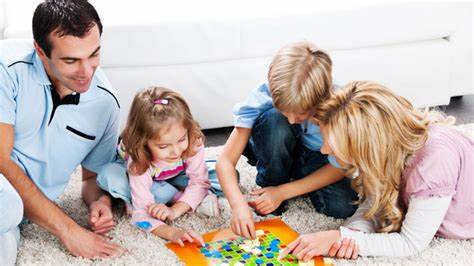My older son recently made a vending machine out of a cardboard box. My daughter created clothing for her Barbies out of paper and tape. My baby went through the hall closet, describing the shoes in a babble that was only one-eighth English. All three participate in a steampunk-inspired world of their own creation called Gearton, for which they build castles and a clock tower out of picture books. When their games are going well, the kids are murmuring, saying to one another, "Pretend we..." or "What if we..." or "The queen must be assassinated." There's also a lot of screaming. Meanwhile, I'm doing the crossword.
我的大兒子最近用紙板箱做了一臺自動售貨機。我女兒用紙和膠帶為她的芭比娃娃做了衣服。我最小的孩子穿過大廳的衣柜,用只有八分之一英語的咿呀學語聲描述鞋子。這三個孩子都在玩由蒸汽朋克啟發、自己創造世界的游戲Gearton,用圖畫書建造城堡和鐘樓。在游戲進行得很順利時,孩子們會喃喃低語,對彼此說,“假裝我們……”或者“如果我們……”或者“女王一定被暗殺了”之類的話。他們也會發出很多尖叫聲。與此同時,我在玩填字游戲。
I have three kids under 10 who don't expect — or even want — to play with me. It took some practice, but over time, we've all learned we're better off doing our own thing: the kids, without stodgy parental interference, and my husband and I, unhooked from the assumption that we have to play to be present.
我有三個不到10歲的孩子,他們并不期待——或者說甚至不想——和我一起玩。這需要一些練習,但隨著時間的推移,我們都認識到我們最好做自己的事情:孩子沒有乏味的父母干預,而我和我丈夫則擺脫了我們必須假裝自已參與其中這種責任。
It wasn't always this way. As a toddler, if my first child wasn't digging in the trash or chewing on the couch cushions, he was rampaging through the house with an imaginary weapon. He never listened. He tried to run into traffic. The constant wrangling and vigilance were so exhausting that my husband and I didn't have the energy to play the way my son preferred — anything that involved full-body contact or pretend violence. Instead, I said no and stop all day long, and when my scolding seeped into the playing, I felt guilty and frustrated. I was a terrible playmate, a tired mother who did little beyond obstructing.
但并非總是這樣。我的第一個孩子在蹣跚學步時,如果不是在垃圾堆里挖東西,也沒有在沙發墊上嚼東西的話,那他就是在用想象中的武器在屋子里橫沖直撞。他從來不聽話。他甚至想沖進車流。不斷的爭吵和警惕讓我精疲力盡,我和丈夫都沒有精力按我兒子喜歡的方式玩耍,因為他喜歡所有涉及全身接觸或假裝暴力的游戲。相反,我拒絕了他,一整天都沒有陪他玩,當我的責罵滲透到玩樂時間,我感到內疚和沮喪。我是一個糟糕的玩伴,一個疲憊不堪的母親,除了阻攔之外,什么也沒做。
 But when my son was about 3, I realized his fictive worlds were vivid enough to continue without me. All he needed, at first, was a listener. After a while, he would head into his bedroom, alone, to transform it into the place that lived in his mind. It was freedom — for all of us. Thus began an experiment with expectation: Little by little, my husband and I would stretch the time our son could safely play by himself.
But when my son was about 3, I realized his fictive worlds were vivid enough to continue without me. All he needed, at first, was a listener. After a while, he would head into his bedroom, alone, to transform it into the place that lived in his mind. It was freedom — for all of us. Thus began an experiment with expectation: Little by little, my husband and I would stretch the time our son could safely play by himself.
但在我兒子3歲左右的時候,我意識到他的虛擬世界足夠生動,沒有我也可以持續下去。起初,他只需要一個傾聽者。過了一陣,他會獨自一人走進臥室,將臥室改造成他心目中的地方。對我們所有人來說,這是自由。于是,一個充滿期待的實驗開始了:我和丈夫會逐漸延長兒子獨自安全玩耍的時間。
My daughter was born a year after that. She is shy and moody, and she has been content to play on her own since she could crawl. I've never met a more self-possessed child — she used to tell me when she needed a nap. She has never liked the sorts of games her brother prefers, and play between them has always been a negotiation. The games they've created combine his love of fantasy and drama with her need for realism; when they set up their pretend yak farm with pillows and stuffed animals, she enjoys an imagined sunset, while her brother worries about predators who have yet to grace this earthly plane.
我女兒在一年后出生。她靦腆而且情緒多變,從會爬起,她就愿意自己玩。我從來沒有遇到過比她更沉著的孩子,她經常告訴我她什么時候需要小睡。她從未喜歡過她哥哥喜歡的那種游戲,他們兩人之間的游戲一直是種談判。他們創造的游戲結合了我兒子對幻想和戲劇的熱愛以及我女兒對現實主義的需求;當他們用枕頭和毛絨玩具搭建起他們的假牦牛農場時,她享受著想象中的日落,而她的哥哥則在擔心尚未出現但會增添色彩的掠食者。
譯文由可可原創,僅供學習交流使用,未經許可請勿轉載。
 But when my son was about 3, I realized his fictive worlds were vivid enough to continue without me. All he needed, at first, was a listener. After a while, he would head into his bedroom, alone, to transform it into the place that lived in his mind. It was freedom — for all of us. Thus began an experiment with expectation: Little by little, my husband and I would stretch the time our son could safely play by himself.
But when my son was about 3, I realized his fictive worlds were vivid enough to continue without me. All he needed, at first, was a listener. After a while, he would head into his bedroom, alone, to transform it into the place that lived in his mind. It was freedom — for all of us. Thus began an experiment with expectation: Little by little, my husband and I would stretch the time our son could safely play by himself.










